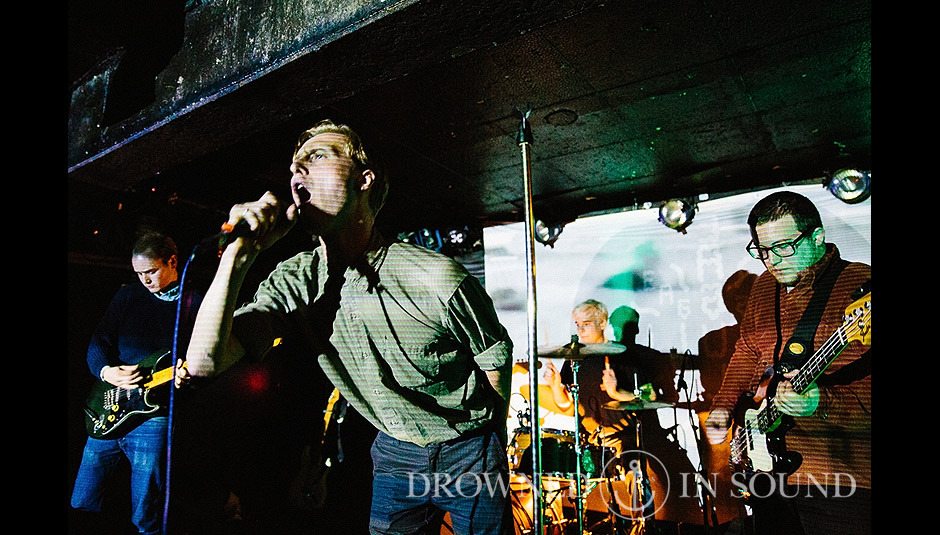Leeds-based five-piece Eagulls have made one of this year's finest albums in the shape of their self-titled debut. Awarded 9/10 here on Drowned In Sound upon its release in March, the record stands as a fitting document of a band in their prime, capturing the explosive live sound and enhancing it tenfold. Indeed, that the album saw the light of day at all owes as much to their perseverance and belief shown in them by label Partisan Records who offered to put the record out after a blistering set at last year's South-By-Southwest festival in Texas.
Having formed four years ago, their rise to the prominent position they currently hold offers hope to any struggling band or musician on the cusp of calling it a day. As well as releasing said debut, this year has also seen them appear on Later With Jools Holland and the David Letterman show, open for Franz Ferdinand and the Manic Street Preachers on sell-out tours while calling time on their day jobs to concentrate fully on the band.
Now coming towards the end of their own headline tour that's seen them play to capacity crowds up and down the land throughout October, DiS caught up with vocalist George Mitchell, drummer Henry Ruddel and guitarist Mark Goldsworthy prior to their sold out show at Nottingham's Bodega.
DiS: How's the tour been so far?
George Mitchell: It's been really good. We're not shocked by how many people have been to see us but...
Henry Ruddel: We're all pretty taken aback by it to be honest. It's probably the best tour we've ever done. Every night has been amazing.
DiS: Your debut album came out earlier this year to an unprecedented wave of acclaim all across the board. Were you expecting that level of recognition or did it come as a complete surprise?
Mark Goldsworthy: We were really surprised. When we first recorded the album we paid for it ourselves and at the time we were hoping to earn enough money to press then hopefully put it out ourselves. We didn't even think it would get that much press at all. When the label (Partisan Records) got involved things started moving really quickly.
George Mitchell: We actually recorded the album two years ago. It had been finished for the best part of a year when we released it. We had to sit on it all that time. We never really thought about whether people would like it back then. We had so much stress making the album and finally getting it released that we didn't care what people thought. We'd got to the point where we were past caring. So now to hear people enjoying it and publications like Drowned In Sound calling it one of the albums of the year it feels like we've achieved something.
DiS: Was there ever a time where you thought the album would never be released?
George Mitchell: We didn't sit down with the specific intention of writing an album until the songs started coming together which eventually ended up on the record. I don't think we took any longer than it would have had a label asked us to write an album to be honest.
Henry Ruddel: There were other things in the way like everyday life blocking us from doing it. But we never set ourselves a deadline anyway. We just did it as and when.
Mark Goldsworthy: It wasn't as though there was any kind of cash injection. It was quite the opposite, which actually gave us enough time to write and practice for a few hours after work every day. And then we booked bits of studio time here and there whenever we could afford it, mostly at undesirable hours. It wasn't as though we'd sat on an album. It was more a case of us having six or seven songs and then deciding to write a few more so as we had an album.
DiS: There seems to be a common theme running through the album. One of disillusionment, despair and disappointment in songs like 'Hollow Visions', 'Yellow Eyes' and 'Soulless Youth' for example.
George Mitchell: There is the disappointment factor in just being British. The fact that you just look at everything with scepticism. There's also a feeling of pessimism there, which people tend to delve into straight away but a lot more. It's more of an educational thing. Analysing what's going on around you. And not just Britain. Everything speaks to people differently in other countries. It's not just for the youth either. There's all different kinds of people coming to our shows. It speaks to a lot of people because they're also going through the same situations. From the age of twelve upwards, and I didn't really think of that when I was writing a lot of the stuff.
DiS: It was an American label (Partisan Records) that signed the band and released the album. Was there any interest fro UK labels?
George Mitchell: At the start a few UK labels did show some interest, but I think by the time we finished the album most of the labels over here had already made up their minds about us. They just read the cover of the book rather than looked inside at what we really were doing. I think it's a godsend that Partisan picked us up anyway. Right from day one they've looked after us properly and we've done what we wanted to do. At the same time, they've also pushed us into doing things we never thought we would be capable of.
Mark Goldsworthy: They have real conviction. It wasn't like they tried to court us by taking us to dinner or whatever. They wanted to put the album out and were quite direct about it. I like that. They weren't mincing their words. They had real passion for it.
George Mitchell: They were straight with us from the start, and now we're all really good friends with them. You hear that a lot, bands saying they're friends with the label and stuff but we actually are. I'm going to stay with them in New York in a few weeks. It's not like they're going to make a quick buck out of us anytime soon anyway.
DiS: With the album being ready before you signed to Partisan, did they make or advise any changes before it was released?
George Mitchell: No. The only thing they did was give us a better mastering opportunity.
Mark Goldsworthy: That's because it wasn't mastered in the first instance. We only had it engineered.
DiS: The production - particularly where the guitars are concerned - sounds very similar to something Flood or Alan Moulder would have come up with in the late 1980s/early 1990s. Was that something you were conscious of during the recording process?
George Mitchell: Production-wise, yeah. We listen to a lot of older music, not necessarily just from the 1980s.
Mark Goldsworthy: There's more layers on a lot of those records whereas nowadays, most labels want everything loud at the front and overproduced. There's no room for any depth. For example, when you listen to a Public Image Ltd album there's so much going on, so many different layers. Now, too much music is in your face, almost like a flatline.
DiS: Sometimes the lyrics get lost in the wall of sound that engulfs a lot of your songs. Do you consider the words to be as important as the music?
George Mitchell: I know some of the lyrics are hard to decipher but that was the sound we wanted at that particular moment in time and I'm happy with the way it turned out. We use echoes and reverb to compliment the sounds of the guitars. I feel it delves deeper into the atmosphere with the lyrics. There are so many records that I listen to where the lyrics are indecipherable but I've felt what it meant already just by how it sounds. And if you were thinking of different words that didn't mean anything like "apples and pears upstairs" or whatever it doesn't really matter. It's like Liz Fraser in the Cocteau Twins. She didn't have lyrics a lot of the time but you felt the depth and knew what she was talking about.
DiS: You appeared on the David Letterman show earlier this year. How did that come about and was it as surreal an experience as it looked?
George Mitchell: It came about through the label being based in Brooklyn, and they've had acts who've been on the show before. We were actually out walking in New York one day and went past where the Letterman Show is filmed. One of the guys from the label said we'd be on there one day and we just laughed, and then a few months later they said we were on there which was unbelievable. And the show itself was weird. It is like walking on to a TV set! People think it's really glamorous but it's actually quite shit. You get there and there's hardly anything to eat or drink. It's like being on 'The Generation Game' with the conveyor belt, except we're the ones being moved along. Which I guess is what it's like when you watch it as well. No one cares which band is on from week-to-week anyway. It's just a platform.
DiS: You've also supported the likes of Manic Street Preachers, Suede and Franz Ferdinand this year. How did it feel playing in front of another band's audience?
Mark Goldsworthy: I think it was the singer from the Manic Stret Preachers that got us on the bill for that Leeds show, because he brought us a bottle of wine to say thanks afterwards.
George Mitchell: Things like that aren't new to us as we've mostly supported other bands. Just not on that big a scale.
Mark Goldsworthy: And also, when I was younger I used to buy Franz Ferdinand and Suede albums. Never in a million years did I think we'd be fortunate enough to play shows with them. I'd probably have been among the audience myself if I hadn't been on stage.
DiS: Are there any new songs in place for the follow-up?
George Mitchell: There's one which we've been playing live on this tour. It's the first song in the set. It's the first semi-finished song since the album. It doesn't have a title yet. I don't like to title things that aren't finished. Things might change by the time we go into the studio.
DiS: Is there a timescale for the second album?
Mark Goldsworthy: We try not to set ourselves deadlines, because whenever we do we never stick to them.
George Mitchell: It's a long way off yet. Things will change from the first album. Soundwise it will be a lot different. The first album is two years old now. Things have changed around us. The music we listen to, things that inspire us.
DiS: You all recently gave up your day jobs to concentrate fully on the band. Do you think there's still a divide in music between those that combine working full time with playing in a band and those with privileged middle class backgrounds?
George Mitchell: I hope there are still a lot of people coming through and making music from a similar background to us. You can still be creative regardless of class.
Mark Goldsworthy: We've always made music because it's what we enjoy doing. It was never about "making it", and that's the best piece of advice I can give to anyone, really. I've seen so many bands give up after a couple of EPs because they didn't get signed and I often wonder why bother in the first place? If you're doing something you enjoy and believe in then stick with it.
DiS: Are there any other bands you'd recommend Drowned In Sound and its readers should be checking out?
Mark Goldsworthy: There's a really good band from Sheffield called Sievehead. Also, Galaxians from Leeds are really good, Perspex Flesh as well.
DiS: If you could sum up 2014 in one sentence what would it be?
Henry Ruddel: A cocktail of conveyor belts.
For more information on Eagulls visit their official website.























